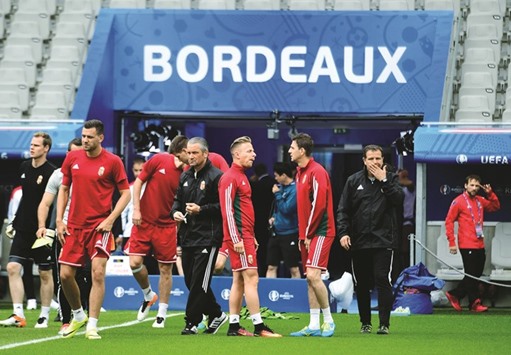As Hungary counts down to its first participation in a major tournament for three decades, long-forgotten football fever is back.
The ‘Magical Magyars’ were the best side in the world in the 1950s when Ferenc Puskas and his fabled teammates were in their prime, famously thrashing England 7-1 in 1954.
But when Hungary take on Austria in Bordeaux today, it will be the first time they have taken part in European or World Cup finals since 1986.
At a metro station in downtown Budapest traders selling football jerseys and tournament album stickers report business is brisk.
A nearby sports travel agent that advertises package trips to the match venues in France — “only two seats left!” — says interest has been huge.
“At least 10,000 fans will be in France,” the firm’s head Balazs Kamuti told AFP.
In 1986, Hungary arrived at the World Cup in Mexico as the top-ranked side in Europe, but collapsed 6-0 to the Soviet Union in their opening game, and crashed out in the first round.
“We collected the cards and stickers, and believed we might even win the whole thing,” recalls Gyorgy Szollosi, editor of the Hungarian version of football magazine FourFourTwo, who was nine years old in 1986.
“After the 6-0, TV sets were thrown out of windows, it was devastating,” he told AFP.
Incredibly, the next 14 qualification campaigns for European Championships and World Cups all ended in failure.
“As the years passed, we began wishing we could get beaten 6-0 in a tournament again, just to be involved at all,” Szollosi said.
Race to the bottom
Hungary’s race to the bottom from the heyday of the Magical Magyars is unparalleled in football.
UEFA statistics produced for the organisation’s 50-year-anniversary in 2004 showed Hungary was the only European country whose vital signs of football life — number of players, pitches, clubs, and coaches — fell since 1954.
That year Puskas’s ‘Golden Team’ lost to West Germany in the World Cup final, a shock defeat considered the beginning of the long malaise.
Since then, particularly since the end of communism in 1989, factors including little investment or TV money, decrepit infrastructure, corruption and hooliganism have contributed to the rot.
“Football hasn’t been fashionable for a long time,” said Szollosi.
Attendance figures have dwindled to a trickle, despite reforms led by football-mad Prime Minister Viktor Orban, including a nationwide stadium construction programme, controversially funded mostly from state coffers rather than private funds.
Miracle
Hungary’s German coach Bernd Storck, appointed last year to oversee youth development and then handed the national team job, has predicted it will take at least another 10 years to fix the sport.
Not one to mince words, the 53-year-old has criticised coaching standards and said Hungarians have an in-built “negative” mentality. “It’s a miracle that we qualified,” he told AFP.
Saddled with a squad containing no regular first-teamer in the top European leagues, Storck has blended in young talents like Adam Nagy and Laszlo Kleinheisler. Kleinheisler, a pugnacious redhead, scored the winner on his debut against Norway in the playoffs to earn the long-awaited ticket to France.
“We played good football in the playoffs, we deserve to be in France, we will try our best there,” said Storck.
Solid performances in warm-up games against Croatia and Ivory Coast suggest Hungary will be no pushovers, but, unlike in 1986, expectations are being kept in check.
Up against Portugal, Austria and Iceland in Group F, Storck acknowledges Hungary are “outsiders”, but says that “everything is possible for third place” — and four third-placed teams qualify for the last 16 this year.
‘Phenomenal experience’
How the team gets on in France may be less important than being there at all however, said Jeno Sipos of the Hungarian Football Federation. “Hopefully kids will be inspired to run about not just in Ronaldo or Messi jerseys, but in Hungarian ones too,” he told AFP.
Many of the fans at the Ivory Coast warm-up on May 20 weren’t even born in 1986.
“I’ve never experienced this before, it’s phenomenal,” Gyozo Szabo, 27, said. “As long as there is no huge failure in France, more kids will nag their parents to let them play football, and parents will let them go, football can become cool again,” Szollosi, of FourFourTwo, said.

(From left) Hungary’s goalkeeper Denes Disbusz, forward Adam Szalai, coach Bernd Storck, midfielder Balazs Dzsudzsak, midfielder Zoltan Gera and assistant coach Andreas Moller arrive for a training session in Bordeaux yesterday. (AFP)
